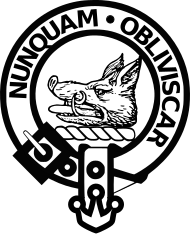Clan MacIver
| Clan MacIver | |
|---|---|
| MacÌomhair | |

|
|
| Motto | nunquam obliviscar ("i will never forget") |
 |
|
| Clan MacIver has no chief, and is an armigerous clan | |
Clan MacIver or Clan MacIvor, also known as Clan Iver, is Scottish clan recognised by the Lord Lyon King of Arms. The clan, however, does not have a chief recognised by the Lord Lyon King of Arms. Because of this the clan can be considered an armigerous clan. The clan name of MacIver is of Gaelic origin, derived from an Old Norse personal name. Various forms of the surname MacIver, like MacGiver, are considered sept names (followers or members) of several historically large Scottish clans, such as clans Campbell and Mackenzie. There exists a Clan Iver society in Fife, Scotland.
The surname MacIver is an Anglicisation of the Gaelic MacÌomhair "meaning son of Ìomhar". The Gaelic personal name Ìomhar is derived from the Old Norse Ivarr. An early man bearing the surname MacIver was Malcolm McIuyr, whose appears on a list of men in the Sheriffdom of Argyll/Lorne in 1292.
According to Alastair Campbell of Airds, it is very unlikely that there is a common origin for one Clan MacIver. Campbell of Airds maintains that the Victorian Principal P. C. Campbell confused matters with his Account of the Clan Iver. Principal Campbell, at the time publication of his Account, was petitioning the Lord Lyon King of Arms to recognise him as "Chief of Clan Iver". Campbell was ultimately unsuccessful in his bid for chiefship. According to Campbell of Airds, the modern Clan MacIver is also a dubious a concept because it encompasses all MacIvers regardless of their origin, and that the "modern game of clan-constructing is again being played".
Campbell claimed that the MacIvers originated in Glenlyon, and settled in Argyll in 1222. The Victorian illustrator R. R. McIan considered the MacIvers to have descended from Duncan, Lord of Lochow, making them descend from the same stock as the Campbells. According to legend, a stronghold of the MacIvers was the ancient fort of Dun Mor (Dunmore)[1], located near Lochgilphead.
...
Wikipedia
